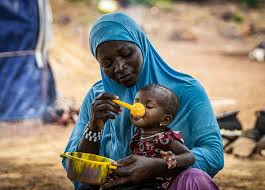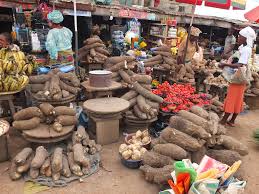In a study released on Thursday alongside the African Union Commission, United Nations agencies stated that at least three-fourths of Africans cannot afford a decent diet and that a fifth are undernourished as a result of an “unprecedented food crisis.”
The 1.4 billion people who live on the continent are facing high rates of starvation and malnutrition as a result of the COVID-19 pandemic, African conflicts, and the damage that Russia’s war in Ukraine has done to global grain supplies, according to the research.
“Millions are expected to be at risk of worsening hunger soon,” the warning reads.
Africa is the only fast-expanding region where the population is becoming poorer, and some are starting to cheer military coups that provide a better living. By 2050, the region’s youthful population is expected to double. Africa is far from fulfilling its pledge to eradicate hunger and all forms of malnutrition by 2025, despite the continent’s abundance of natural resources.
In West and Central Africa, armed conflict has driven millions of people from their communities, and severe weather and climate change pose a serious threat to farmers in East Africa. As food prices continue to rise and salaries cannot keep up, many families are finding it more and more difficult to eat.
In contrast to 42% of people worldwide, the majority of Africans—roughly 78%, or over one billion people—remain unable to afford a healthy diet, and this percentage is still growing, according to a report from the Food and Agriculture Organization, the World Food Programme, the African Union Commission, and the U.N. Economic Commission for Africa.
342 million Africans faced “severe food insecurity” in 2022, the report claims. According to the report, that accounted for 38% of the 735 million hungry people on the planet.
Children under five are among those most impacted by the food crisis in Africa; according to the report, 30% of them are stunted as a result of malnutrition.
Together with representatives from the other agencies, Abebe Haile-Gabriel, the regional representative for FAO in Africa, stated, “Countries must step up their efforts if they are to achieve a world without hunger and malnutrition by 2030. This is due to the deterioration of the food security situation and the lack of progress towards the WHO global nutrition targets.”
The agencies observed that the effects of COVID-19 are still being felt throughout the continent. They said that since the pandemic’s beginning, 57 million more Africans have experienced malnutrition, raising the total to around 282 million last year.
The majority of this deterioration happened between 2019 and 2022 during the pandemic, the report states. “Hunger has worsened substantially after a long period of improvement between 2000 and 2010.”
Nearly 93% of Nigeria’s 210 million citizens, the largest economy in Africa and a major producer of oil cannot afford a healthy diet, according to the survey.
These circumstances are making many wonder why the governments of Africa are not using the continent’s wealth to improve the lives of its people.
“We hope the findings will create a wave of momentum for the transformation of agrifood systems, encompassing other sectors like education, health, and energy, to improve productivity, nutrition, the environment, and everyone’s quality of life,” the U.N. agencies stated.





















